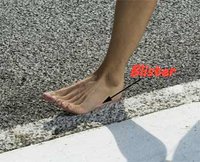The 6 1/2 Hour Marathon Survivor Race Strategy
The goal of the marathon survivor race strategy is to finish a marathon within the typical 6 1/2 hour cutoff time at most marathons. The marathon survivor strategy is appropriate for those who've never run 26.2 miles before, for slower runners, or those who have not trained optimally. If you read our 30 day marathon race schedule, you can figure out if you fit in the "marathon survivor" category.

Let's analyze the basics of this strategy first. To cover 26.2 miles in 6 1/2 hours, you'll have to average 14 min 52 sec for every mile. That's just slightly above 4 miles per hour. A very brisk walk is about 4 mph, but that's difficult to keep up with for 26.2 miles. A better strategy is a run/walk formula. Overall, we're going to aim for 60% running and 40% walking. This ratio of running to walking will change as we progress through the race, favoring more and more walking in the later stages of the race.
We're going to break the marathon into five parts: pre-race preparation, miles 0-10, miles 11-15, miles 16-20, and miles 21-26.2
Part 0: Pre-Race
Read the Marathon Pre-Race Checklist and come back!
As an added note, wearing a GPS running watch will be very useful for your pacing in the race. If the course is well-marked (many marathons mark every mile) you can use a regular watch to aid in your pacing.
Part 1: Miles 0 - 10
If you're nervous before you start, don't worry. A marathon might be a long distance, but it's simply step after step. That's how you must think through the entire race. Never let thoughts creep into your mind like "I'm feeling tired and I still have 15 miles left!" That'll only make things worse. Instead, tell yourself "I'm tough, I feel good, and I'm going". Repeat those words for when you're hurting (yes, you will be) and they'll get you through the race.
The strategy for your opening 10 miles is to run 80% and walk 20%. When you're running, you should feel little effort. If you're breathing at all heavy, you're running too fast. A person in the marathon survivor category should be able to run about 12 mins per mile (5 mph) at a relatively easy pace. After each mile, walk for 3 minutes. We're looking for an 18 min/mile walking pace, which is about 3.3 mph. That's a good paced walk, but not a super fast speed walk. Using this combination, each mile should take about 13 minutes.
At a 14 minute per mile pace, your timing should be as follows:
Mile 3 - 39 minutes Mile 6 - 1 hour 38 minutes Mile 10 - 2 hours 10 minutes
If you cross the 10 mile marker at 2 hours and 10 minutes (2:10), you've built up a bit more than 18 minutes of buffer for later on in the race (to finish in 6:30). If you're under 2 hours at mile 10, be very careful that you're not exceeding your capabilities. It's very easy to run fast in the early miles, only to pay for it later. If you're more than 10 minutes behind this pace (2:20+), you'll need to walk a bit less in our next part.
It's a good idea to drink water or sports drink about every 2 miles. If you're thirsty, drink a whole cup. If you're not very thirsty, just take a couple of sips. There's no need at your pace to run through the water stations, just maintain a brisk walk. In many marathons, the first 10 miles will be in the early morning when it is cooler, and you'll be sweating less, so you won't have to drink as much now as possibly later in the race.
Hopefully after 10 miles you're feeling pretty good. You should still be engaged in the excitement of the marathon and the runners around you. At this point, you've probably settled into a grouping of people that are pacing similar to you. You've got a few hours ahead of you, making a few friends along the way can be a big help!
Part 2: Miles 11 - 15
This part is 5 miles, and you'll be going past the halfway mark. We're going to walk a bit more each mile. Once you hit that mile 10 marker, walk for 4 minutes instead of 3. We're going to aim for the same brisk walking pace of 3.3 mph (18 min/mile). After 4 minutes, run at 5 mph (12 min/mile). At this pace, you'll cover each mile in about 13 min 38 sec, but we'll round it up to 14 min per mile.

Assuming 2:10 to reach mile 10, at this new pace, you'll arrive at the following mile markers:
Mile 12: 2:38 Mile 13.1: 2:53 (half-marathon) Mile 15: 3:20
At mile 15, 3 hours and 20 minutes is our target. If you're 10 mins slower or 10 minutes faster (3:10-3:30), you're in good shape. At 3:20, we're ahead of our full-race pacing goal by 23 minutes. That's a good buffer that we'll need in the final miles.
If you're faster than this range, and you feel good, keep it up! You're probably going to easily beat 6 1/2 hour finish time. But, if you're feeling bad, it means you've gone out faster than you should have. You should spend the next mile walking, drink sports drink for the calories, and try to eat something if it's available.
If you're slower than 3:30, there is still hope to finish in 6 1/2 hours. You'll just need to run a bit more and walk a bit less than what is recommended in Part 3 and Part 4.
At mile 15, your body is probably starting to hurt. This is about the time when the big leg muscles become sore: quads, hamstring, and calves. Barring any serious, searing pain, you're probably fine to keep going. Some pain at this point is normal and you just have to keep going. Don't forget, "I'm tough, I feel good, and I'm going".
Part 3: Miles 16 - 20
We'll be covering another 5 miles in this part. This can be a very challenging time in the race, mentally and physically. You still have a good amount of distance to cover and your body is going to start feeling the effects of the 15+ miles you've already overcome. It is most important to stay focused on completing this part with the following pacing plan: At the mile 15 marker, walk for 5 minutes at 3.3 mph. Then start running. We're going to assume that running at 12 min/mile pace is going to get more difficult, so we're going to slow this a bit to a run pace of 13 min/mile pace. Repeat this walk/run cycle for every mile until you reach mile 20. Each mile will take just a bit less than 14 1/2 minutes to complete.
Here are some notable points in the race;
Mile 17: 3:49 Mile 19: 4:18 Mile 20: 4:33
If you reach mile 20 at 4 hours and 33 minutes, you're doing great. Anything within 15 minutes of this time still gives you a good chance to finish the marathon in 6 1/2 hours or less! If you're much over 5 hours at mile 20, hopefully you still have a lot of energy, because you'll need to push it for 6 1/2 hours. (Note: If you're in a 7 hour time cutoff race, 5 hours at mile 20 is solid and you're well on your way to finishing.)

At mile 20, many marathoners, both inexperienced and experienced begin to run low on glycogen (sugar) fuel in the body. If you're starting to feel very weak and dizzy, you're what we call "hitting the wall" or "bonking". It's normal, but it's hard to come out of it without stopping. We recommend reading our article, Recover from Hitting the Wall, before you do your race.
Part 4: Miles 21-26.2
Climbing Mt. Everest is a very difficult challenge that takes a big commitment in both time and money, something most people can't possibly do. The marathon has been aptly called "Every Person's Everest", as it's a tough challenge but is much more accessible to nearly everyone. You're going to realize why it's a tough challenge when you get past mile 20. This is the time when the body is running low on fuel, and you've already been out for more than 4 hours.
There will be a big physical barrier to overcome in these final miles. Your legs will probably feel like a mixture of pain and numbness, you'll be exhausted from the last 20+ miles, and many people around you will also be suffering. But this is the time to dig deep. It helps to smile at some of the marathoners nearby, offer them some words of encouragement. Helping them will help you too.
You'll be in pain, hopefully not excruiciating pain, and the course is to just push through the pain, knowing that it'll be over soon. If you've blown a tendon, or stress fractured a bone, finishing may not be possible - you've got to recognize the difference between normal pains and excruiciating ones. Most people can. Those excruiciating ones feel like a "10" on a pain scale of 0-10. However, your normal pains will likely feel like a "7" or "8" during this part. If you are in a lot of pain that's in the extreme category, find a medical station and get checked out.
On to our pacing - assuming you're at 4:33 crossing mile 20, that leaves you with 1 hour and 57 minutes to complete 6.2 miles. That's just slightly under 19 minutes per mile. You could do a somewhat fast walk for the remainder and make it in. However, your legs probably aren't working as well as normal, and maintaining a fast walk for 6.2 miles may be difficult. Also, you probably want to have a few minutes buffer, just in case you run into extra difficulties.
We're going to aim for a 50/50 split between a slow shuffle run (15 min/mile, or 4 mph) and a moderately slow walk (21 min/mile or 2.85 mph). This combination will give you 18 minutes per mile, which will get you to the finish about 5 minutes before the 6 1/2 hour cutoff.
It depends on how you feel, but a good way to do this section is to run for 2 minutes (4 mph) and then walk for 2 minutes (2.85 mph). Repeat this for all 6.2 miles. Time the water stations so that your walking portion goes through them. You can adjust the split times between running and walking, to 1/1, 3/3, 4/4, or 5/5. The point is to devote about equal times to running and walking and to set a pace that moves you ever forward.
Eating something in this part is not necessary, but can be very helpful. Many of the water stations at this point in the race will also have food items (fruit, candy, and gels are the most common), it's not a bad idea to try and get down 50-100 calories before mile 23. A whole banana has about 100 calories in it, and an orange has 50. Most gels are around 100 calories. If you're feeling pretty crappy, and can tolerate caffeine, a gel with some caffeine in it (20-40 mg, or about 1/4-1/2 cup of coffee) can give you a boost. In case you're worried, this small amount of caffeine won't dehydrate you.
[adsense:728x90:3134407818]
"I'm tough, I feel good, and I'm going". Repeat that sentence every time a bad thought creeps into your head (like "I can't do this." or "I'm dying"). Replace those bad thoughts with good ones and you'll overcome the big mental barrier of the marathon. Even though a marathon feels like such a physical challenge, it's often the mental barrier that puts up the most fight. And overcoming that mental barrier is one of the most personally rewarding things about finishing a marathon!
When you get near that finish line, don't forget to take in everything around you. Cherish the moment! You are a marathoner!






